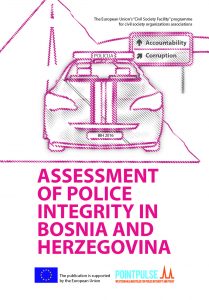THE ASSESSMENT OF POLICE INTEGRITY IN BOSNIA AND HERZEGOVINA 2016
THE ASSESSMENT OF POLICE INTEGRITY IN BOSNIA AND HERZEGOVINA 2016
Author(s): Mirela Hodović
Subject(s): Politics / Political Sciences, Politics, Governance, Security and defense, Corruption - Transparency - Anti-Corruption
Published by: BCBP Beogradski centar za bezbednosnu politiku
Keywords: police integrity; Bosnia and Herzegovina; police sector; corruption
Summary/Abstract: Due to the complexity of the police system, the integrity of police in Bosnia and Herzegovina is difficult to review. All police institutions have, however, established external mechanisms of oversight and control. Still, the majority of these oversight bodies do not sufficiently use the existing communication resources, which negatively affects the transparency of their work, while independent bodies have no direct authority to conduct investigations against police officers. Internal control mechanisms in all law enforcement agencies provide a good framework for control of the legality of police work. Certain ambiguities however do exist in practice and are related to the independence and objectivity of the work of heads of departments for internal control; they are appointed by their immediate superiors and are directly accountable to said superiors for their work. Insufficient progress of internal control bodies has also been observed in terms of their contribution to determining criminal and misdemeanour liability of police officers and their transparency of work. Police institutions in Bosnia and Herzegovina do not pay adequate attention to human resources management, where the greatest concerns revolve around integrity. There are no separate, comprehensive or integrated strategies or organisational units which would deal with all the aspects of human resource management in one place. Internal regulations allow managers to directly affect employees' career advancement. Internal control units are sometimes prevented by their superiors from performing their job effectively. All this ultimately de-stimulates the employees and reduces the efficiency of the police institution as a whole. The public procurement system is still underdeveloped. Public procurement frequently suffers from lack of adequate administrative capacity because law enforcement agencies do not have enough employees working on public procurement; under such conditions, planning and implementation of public procurement becomes a very difficult task. Findings of auditors show that public procurement procedures in police sector institutions are generally not carried out in the most efficient manner and/or in accordance with the Law on Public Procurement.
Series: Beogradski Centar za Bezbednosnu Politiku - Analysis
- Page Count: 53
- Publication Year: 2016
- Language: English
- Content File-PDF

